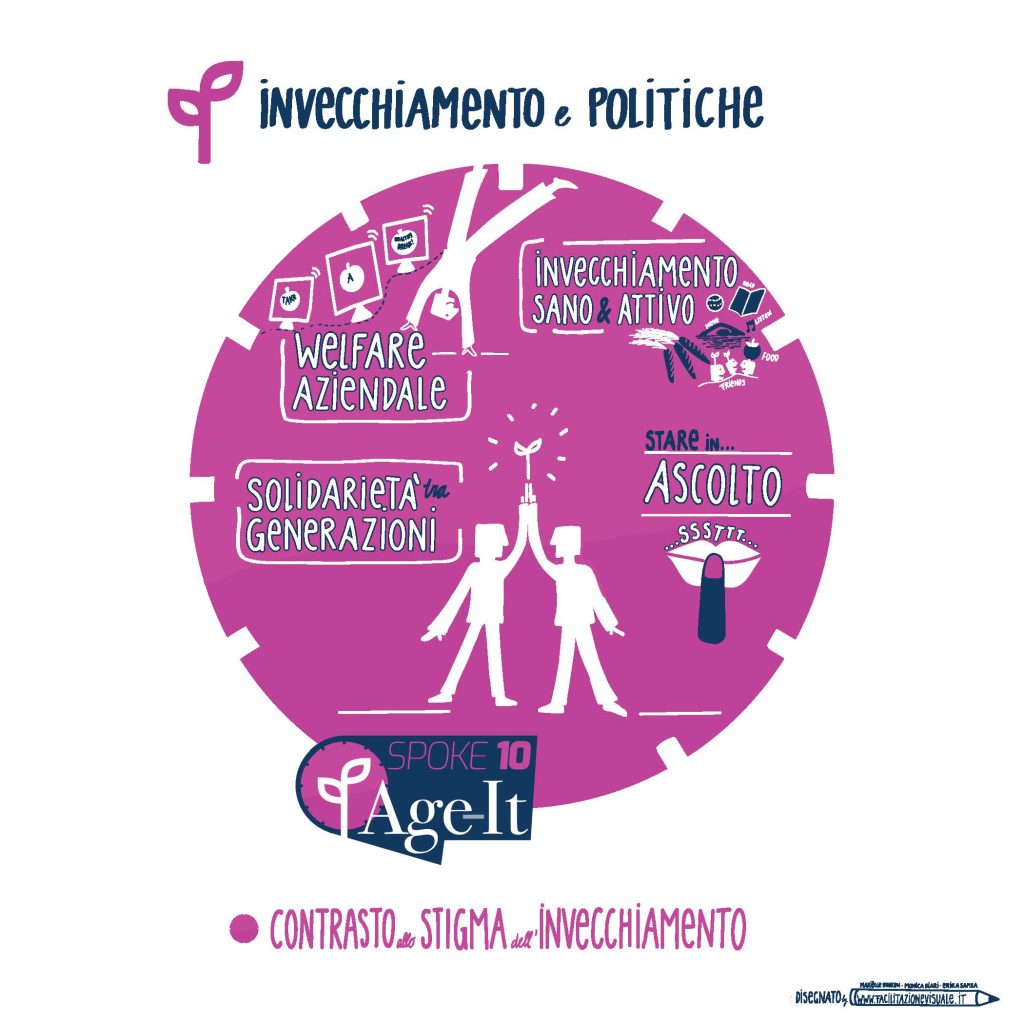
Mainstreaming ageing by building institutional mechanisms
for better and future-oriented health policy making and prevention
Leader: Gianluca Aimaretti, UPO
Co-Leader: Aleksandra Torbica, BOCCONI
Affiliati: UNINA, UNISR, UNIMIB, INRCA, UNIBO, UNIVE
Spoke Themes
This challenge integrates all the previous ones by addressing policies on frailty and integrated care and their application to:
(1) suggest strategies to increase inclusion of under-represented populations and synergies between national and regional programs;
(2) enhance the present polices and to develop risk-based strategies to improve the health status and well-being of older adults.
The final aim is to inform policies to match the appropriate services to the needs of older people and guarantee an integrated response across different institutional settings (NHS, community social care, formal home care).
Structure
Activities are organised around 6 WPs, which are mainly vertical or cross cutting.
Disciplines
Medicine, Epidemiology, Sociology, Philosophy, Health Economics, Health Policy, Education

Work Packages
Leader: Prof. Fabrizio Faggiano, Università di Piemonte Orientale
WP1 will: 1) develop and align policies and strategies on frailty and integrated care reflecting the most recent WHO concepts and guidelines; 2) scaling up results of EU initiatives and national and local programmes (such as National Chronicity, Prevention and Dementia Plans) to prevent and manage frailty and chronic diseases; 3) develop and implement a systematic collection of policies; 4) develop strategies to increase inclusion of underrepresented populations in ageing research.
Prof. Stefano Campostrini, UNIVE
WP2 aims to enhance the present policies and develop risk-based strategies to improve the health status and well-being of older adults in diverse populations, by developing statistical analyses and new modelling approaches to understand health, social, biological, and economic disparities related to ageing.
Prof. Fulvio Ricceri, UPO
WP3 will identify risk-based personalised interventions through the EPIC-Turin cohort, where a bio-social risk of unhealthy ageing will be computed and subjects will be recalled to receive a personalised prevention program. It will test and evaluate a risk-based strategy to promote healthy ageing in order to design new policies for increasing independent living, health status, and well-being of older adults that could take into account the different risks of unhealthy ageing.
Prof. Gianluca Fiorentini, UNIBO
WP4 aims to provide policy makers with effective tools to improve the implementation of health promotion and prevention programs targeting older adults through the adoption of a systemic approach focussing on the interaction between institutional, financial, and technological solutions to improve compliance. The policy implications will be based on data platforms merging administrative sources on the consumption of healthcare services with qualitative and supply-side information on the interventions provided by primary care professionals, specialists and various intermediate care structures.
Prof. Laura Formenti, UNIMIB
WP5 will: 1) implement a territorial network logic in dispersed geographical areas, involving participants in interprofessional and intersectoral partnerships; 2) gather, organise and feed the ecosystem with relevant, not measurable knowledge from the ground, based on participants’ voices and experiences; 3) share the development of new policies with local communities and networks of professionals, administrators, ageing citizens and their proximal care system
Prof. Aleksandra Torbica, BOCCONI
WP6 aims to empirically investigate the needs of the older population to define different policy segments. This goal is of paramount importance to inform policies to match the appropriate services and guarantee an integrated response. Furthermore, this WP aims to investigate the impact of community care (both its social and healthcare component) provided to older people on the consumption of hospital services as well as its effect on health outcomes and well-being.
Key Outputs
- Align policies and strategies on healthy ageing, on frailty and integrated care.
- Theoretical and data-driven study of the dynamic and mechanisms generating sub-population health inequalities in longevity and healthy ageing – Mobility compression, regional, gender and cohort inequalities.
- Personalized Prevention: a risk-based strategy to promote active life and increase independent living, health status, and well-being of older adults.
- Policies to improve the compliance with organizational and clinical guidelines in programs of health promotion and prevention for older people.
- Aligning the new health and social care policies to emerging needs: a bottom-up community-based systemic approach.
- Investigating the gap between the needs of the ageing population and the institutional responses.
